 Can anything be built to last forever? Maybe not, but there are certainly many examples of long-life structures around the world. The Great Wall of China was constructed over 2,200 years ago. The initial Egyptian pyramids were built more than 4,500 years ago. The Appian Way, considered the first highway, was constructed by the Romans in 312 BC. So it is possible!
Can anything be built to last forever? Maybe not, but there are certainly many examples of long-life structures around the world. The Great Wall of China was constructed over 2,200 years ago. The initial Egyptian pyramids were built more than 4,500 years ago. The Appian Way, considered the first highway, was constructed by the Romans in 312 BC. So it is possible!
Today, the asphalt industry can construct long-life pavements or perpetual pavements by using the right combination of asphalt materials and an adequate thickness to withstand traffic loads. Virginia has one route, I-81 north of Winchester, that won a perpetual pavement award from the Asphalt Pavement Alliance. Constructed 40 years ago, this section of I-81 has only had routine maintenance. While this route was recognized nationally, Virginia has numerous roadways that fit the perpetual pavement definition.
 Perpetual pavements have many benefits to society. By building a pavement for a long-structural life, maintenance costs can be minimized. Removing and replacing the surface every 15 to 20 years is much cheaper than extensive patching at shorter intervals. By staying out of the road, the user delay and inconvenience is removed. This will improve fuel economy as well with less idling of engines. Perpetual pavements demand fewer virgin materials over their life by confining repairs to typically 2 inches or less. Finally, perpetual pavements make sense. By building pavements to their optimal thickness with the right materials, they save the taxpayers and owners money while preserving the environment.
Perpetual pavements have many benefits to society. By building a pavement for a long-structural life, maintenance costs can be minimized. Removing and replacing the surface every 15 to 20 years is much cheaper than extensive patching at shorter intervals. By staying out of the road, the user delay and inconvenience is removed. This will improve fuel economy as well with less idling of engines. Perpetual pavements demand fewer virgin materials over their life by confining repairs to typically 2 inches or less. Finally, perpetual pavements make sense. By building pavements to their optimal thickness with the right materials, they save the taxpayers and owners money while preserving the environment.